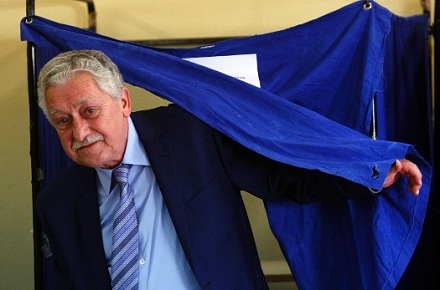
With Fotis Kouvelis, the head of Greece’s Democratic Left (Δημοκρατική Αριστερά), the most moderate of the three vaguely anti-bailout leftist groups to thrive in Sunday’s election, now in discussions with Evangelos Venizelos, the former finance minister and the leader of center-left PASOK, to form a national unity government, the center spotlight of Greek — and European politics — now shines on Kouvelis, who was ranked the most popular party leader throughout the election campaign.
Kouvelis, at 63 years old, is as soft-spoken and understated as his young leftist rival Alexis Tsipras is brash:
Avoiding the fiery rhetoric and bombastic speeches popular with Greek politicians, Kouvelis speaks in a measured tone and is seen as a figure who can restore the country’s dignity.
”Political intensity and the power of a stance or a proposal cannot be found in yelling, but in the content of what you have to say,” Kouvelis told Reuters.
Pledging to ditch austerity policies without jeopardizing Greece’s membership of the euro zone, Kouvelis has successfully lured away former PASOK voters disillusioned with the Socialist party’s support for unpopular wage, spending and pension cuts.
A fixture in Greek politics since the 1980s, he has been a member of parliament since 1989 (except for a brief spell from 1993 to 1996), and served briefly in 1989 as a minister of justice.
Kouvelis formed the Democratic Left in 2010 with fellow members of Synaspismós, the leading party in the SYRIZA group that Tsipras leads, over differences with Tsipras’s more radical opposition to the bailout and Greek budget cuts. Prior to Sunday’s election, the Democratic Left held 10 seats in the prior Hellenic parliament — four former SYRIZA MPs and six former PASOK MPs who joined the Democratic Left only in March 2012. On Sunday, the Democratic Left won 19 seats and nearly 7% of the vote.
Kouvelis has walked a tight line throughout the election campaign — he strongly supports Greece’s continued membership in the eurozone and his party’s slogan has been “the responsible left,” and throughout the campaign, he refused to join forces with SYRIZA. After Sunday’s vote, he also seemed to rule out a coalition with PASOK and the center-right New Democracy as well. Nonetheless, he has strongly opposed the harsh austerity and other terms mandated by the bailout Greece has received — his program has emphasized the renegotiation of Greece’s bailout, including some debt forgiveness from the European Central Bank. He also favors stimulus spending to bring Greece out of its current near-depression economic conditions.
If he is serious about joining a coalition with PASOK, the key question will be how far PASOK (and New Democracy, if it joins any such unity coalition) is willing to consider a renegotiation of those terms.
If any such coalition succeeds, Kouvelis will reap the political benefits of pulling the pro-bailout parties into an acknowledgement that the current bailout terms are too harsh, bringing some relief to Greece’s economy and a reprieve from the harshest elements of its austerity program, and restoring some stability to Greece’s politics — for a while — without drawing the international ire that would result from a further debt default or a return to the drachma.
![]()

